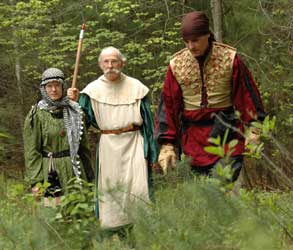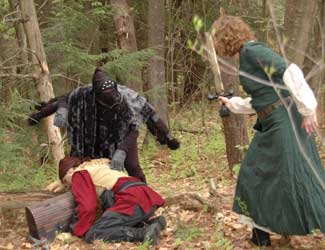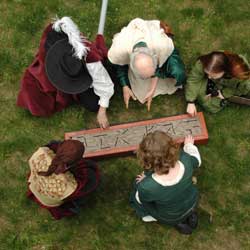What's a LARP? How does a LARP work?
Maybe you've been to a "murder mystery" party. You and your friends portrayed characters (the gangster, the magnate, the moll, and so on) and then interacted with one another, in character, learning clues about the murder. Well, if so, congratulations: you've already attended a LARP.
LARP stands for "live-action role-playing". "Live-action" means that you act out your part in person, rather than describing your actions or controlling a character on a game board, computer, or video game. "Role-playing" means you're playing a role: a fancy name for acting, really.
Our kind of LARPing is a lot like improv theater. You make up a character, deciding on your character's personality and background. During the event, you then portray that character, and then react to what happens based on how you think your character would react. As with traditional theater, you also dress up like the character, so that the scene looks and feels "real".
How does the story unfold?

In traditional theater, there's a cast and an audience, and they are very separate. The cast knows the whole script, and knows right from the start how the story plays out. The audience knows none of the script, and does nothing throughout the show; they just watch.
LARPs like Quest don't work like that. The folks who run the event first develop a setting and a sequence of events, but they don't pre-determine the ending. They'll set up the initial scene, and then see what you and the other players do in response. (The writers will have tried to guess what you'll do, and will have come up with a bunch of possible reactions for the staff, but nothing has been pre-determined.)
More importantly, there is no "audience". You, the players, are just as important to the story as the roles the event staff are acting out. Your roles and decisions are just as important as the material that the staff provides. There are no seats for the "audience", and no "stage"; everyone's a part of the scene.
How can you tell what happens?

In traditional theater, the playwright picks the outcome: Laertes and Hamlet fight, and Laertes stabs Hamlet first. It's written in the script. But in LARPing, there is no script. So how do you determine who struck first? Well, you act it out. If you're Laertes, you attack Hamlet, and if you stab him first, well, then you stabbed him first. Simple as that.
Quest has a system for modeling these kinds of conflicts, one that simulates conflict without any real danger. Since our events take place in a roughly medieval world, our armed conflict uses swords. If two characters come to blows, they can face off in combat. But we use foam padded swords, so that there is no real risk. To this, we add some rules to simulate the injuries you'd be taking if those foam swords were real. (For instance, if a foam sword strikes your arm, your arm is "wounded", and you can't use it until it has healed.) Since our events also incorporate elements of the fantastical, we have a system to simulate "magic" as envisioned in fantasy writings and works.
We have similar rules to let your character be skilled at things that you, the player, aren't good at. If your character is supposed to be adept at sneaking around undetected, but you the player are clumsy, we have a mechanic to let you "hide". Is your character supposed to be learned? We have a system for giving you extra knowledge about the event. So your character can be sneaky, or a smooth talker, or nimble with traps -- even if you, the player, are not.
Can you give me an example of how this plays out?

Suppose the setting of the event is a small village that's been attacked by bandits, and the villagers have put out a call for help. You and the other players portray the heroes who come to the village's rescue. The staff will portray the villagers and the bandits.
Let's say the opening scene is at the village's tavern. You and the other players might first meet the locals, and ask them questions about the bandits. When did they start attacking? Where do they come from? What kinds of things do they steal? By conversing with the locals like this, you might learn valuable clues.
Later, word comes that the bandits have been spotted outside of town. What do you do? Well, that's up to you. Maybe you expect that the bandits will approach, so you decide to help the villagers boost the town's defenses. Maybe you decide to help the villagers hide their valuables. Maybe you decide to go out and scout around, hoping to learn where the bandits' hideout is, so that you can make a counterattack and stop them for good. It's up to you!
The staff will gauge what you (and the other players) decide to do, and react accordingly. If you decide to help the villagers protect the village, those villagers will react to whatever ideas you have, based on their own characters. If you decide to go after the bandits' hideout, some of the staff will then portray the bandits for your dangerous encounter with them!
Starting to make sense now?
We hope so! Let's move on to our New Player Guide and get started!
